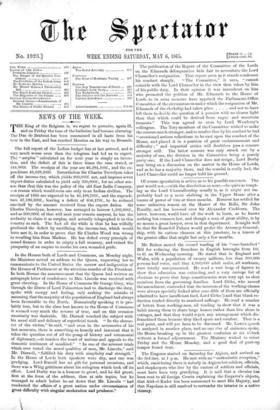The full report of the Indian budget has at last
arrived, and is very much worse even than the telegram had led us to expect. The " surplus " calculated on for next year is simply an inven- tion, and the deficit of this is three times the sum stated, or 344,000/. The receipts of the year are 46,284,1061., and the ex- penditure 46,628,249/. Nevertheless Sir Charles Trevelyan takes off the income-tax, which yields 900,000/. net, and imposes seven export duties calculated to yield only 330,000/., for no other rea- son than that this was the policy of the old East India Company, —a reason which would seem one only to an Indian civilian. The receipts of 1865 are expected to be 46,488,7601., and the expendi- ture 47,186,930/., leaving a deficit of 698,170/., to be reduced one-half by the amount received from the export duties. Sir Charles Trevelyan, however, has arranged to borrow 1,200,0001., and as 500,000/. of that will next year remain unspent, he has the audacity to claim it as surplus, and actually telegraphed it to this country as such. The fact all the while is that he has wilfully produced the deficit by sacrificing the income-tax, which would have met it, in order to ptove that Sir Charles Wood was wrong in recalling him from Madras. He has defied every principle of sound finance in order to empty a full treasury, and ruined the prosperity of an empire to soothe his own wounded pride.






























